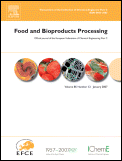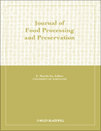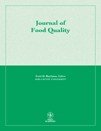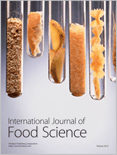
Food Engineering Reviews
Scope & Guideline
Fostering Collaboration among Scholars and Industry Experts.
Introduction
Aims and Scopes
- Innovative Food Processing Technologies:
The journal covers a broad range of innovative food processing techniques, including non-thermal processing, drying technologies, and advanced thermal treatments, aimed at improving food quality, safety, and shelf-life. - Sustainable Practices in Food Engineering:
Research on sustainable methods and technologies that minimize waste, reduce energy consumption, and promote environmentally friendly food production practices is a core focus. - Food Quality and Safety Assessments:
The journal emphasizes methods for assessing food quality and safety, including the use of advanced technologies such as hyperspectral imaging, machine learning, and microbial inactivation techniques. - Application of Nanotechnology in Food Systems:
Exploration of nanotechnology applications in food packaging, preservation, and functional food development is a recurring theme, highlighting its potential to enhance food safety and functionality. - Mathematical Modeling and Simulation:
The use of mathematical models and simulations to understand and optimize food processing operations, including heat and mass transfer, microbial kinetics, and texture analysis, is a significant area of research.
Trending and Emerging
- Non-Thermal Processing Technologies:
There is a significant increase in research related to non-thermal processing technologies, such as cold plasma and pulsed electric fields, which are gaining attention for their potential to enhance food safety and quality without compromising nutritional value. - Artificial Intelligence and Machine Learning Applications:
The integration of AI and machine learning in food quality control and safety assessment is emerging as a vital theme, indicating a shift towards data-driven approaches in food engineering. - Sustainable Food Engineering Practices:
Research focused on sustainability, including energy-efficient processes and waste reduction strategies, is trending as the sector seeks to address environmental concerns in food production. - Advanced Imaging and Sensing Technologies:
The use of advanced imaging techniques, such as hyperspectral imaging, for real-time monitoring and quality assessment of food products is an emerging area of interest. - Valorization of Food By-Products:
Research on the valorization of food by-products and waste management is gaining traction, aligning with global efforts to minimize food waste and enhance resource efficiency in food systems.
Declining or Waning
- Traditional Thermal Processing Methods:
There has been a noticeable decrease in research focused on conventional thermal processing methods, as the field shifts towards exploring more innovative and sustainable alternatives. - Basic Food Chemistry and Composition Studies:
Research centered on basic food chemistry and composition is becoming less frequent, possibly due to an increased emphasis on applied research and technological advancements in food processing. - Conventional Food Packaging Technologies:
The exploration of traditional food packaging technologies is declining as the field moves toward more innovative and sustainable packaging solutions, such as biodegradable materials and active packaging. - General Edible Coatings and Preservation Techniques:
While edible coatings are still relevant, there is a decline in studies focused on general preservation techniques, with a growing interest in more specific and advanced methods. - Static Quality Assessment Techniques:
Research on static quality assessment methods is waning, as dynamic and real-time assessment techniques gain more attention in the context of food quality control.
Similar Journals

FOOD AND BIOPRODUCTS PROCESSING
Pioneering research for enhanced food quality and sustainability.FOOD AND BIOPRODUCTS PROCESSING, published by Elsevier, is a leading journal dedicated to advancing the fields of biochemistry, biotechnology, chemical engineering, and food science. With a strong impact factor and robust rankings—Q2 in Biochemistry and Biotechnology, and Q1 in Food Science—it serves as an essential resource for researchers, industry professionals, and students alike. The journal focuses on innovative research and practical applications in the processing of food and bioproducts, spanning from raw material transformation to product development. By fostering the exchange of knowledge and ideas, FOOD AND BIOPRODUCTS PROCESSING aims to enhance food quality and sustainability while addressing global challenges in food security and environmental impact. With an accessible format and a diverse pool of contributors, this publication stands as a vital platform for groundbreaking studies, making significant contributions to the advancement of technology and practices in food processing and production.

Applied Food Research
Innovating Insights in Food SystemsApplied Food Research, published by Elsevier, is an esteemed journal that plays a critical role in advancing the field of Food Science. With an ISSN of 2772-5022, the journal has established itself as a premier outlet for high-quality research, achieving a commendable Q1 ranking in the 2023 Food Science category and a 63rd percentile in Scopus rankings for Agricultural and Biological Sciences. Covering a diverse range of topics from food safety to innovative processing techniques, Applied Food Research seeks to publish pioneering studies that enhance our understanding of food systems and contribute to broader discussions on sustainability and nutrition. As it converges on its fourth year of publication, researchers, professionals, and students alike are encouraged to engage with its content through various open access options, ensuring widespread dissemination of knowledge in a field that is vital to global health and well-being. Operating out of Amsterdam, Netherlands, this journal is poised to be an indispensable resource for anyone dedicated to making significant contributions in the domain of food science.

JOURNAL OF FOOD PROCESSING AND PRESERVATION
Advancing Food Science through Innovative ResearchJOURNAL OF FOOD PROCESSING AND PRESERVATION, published by Wiley-Hindawi, stands as a vital resource within the fields of Food Science, Chemical Engineering, and Chemistry. With an ISSN of 0145-8892 and an E-ISSN of 1745-4549, the journal has been a beacon of knowledge since its inception in 1977, continuing to provide valuable insights to the research community until 2024. Recognized for its quality, it holds a noteworthy Q2 ranking in 2023 across multiple categories, including Food Science and Chemical Engineering, indicating its influential contribution to the academic discourse. Although it offers no open access, the journal remains a crucial platform for disseminating groundbreaking research and innovative methodologies in food processing and preservation. Researchers, professionals, and students can significantly benefit from its comprehensive reviews, original research articles, and case studies, aimed at advancing knowledge and practices in food technology. By bridging the gap between theoretical advancements and practical applications, the JOURNAL OF FOOD PROCESSING AND PRESERVATION plays an essential role in addressing global food safety, sustainability, and quality challenges.

FOOD SCIENCE AND BIOTECHNOLOGY
Unleashing the Power of Biotechnology in Food ScienceFOOD SCIENCE AND BIOTECHNOLOGY, published by the Korean Society of Food Science & Technology (KOSFOST), stands as a prominent peer-reviewed journal dedicated to advancing knowledge in the fields of food science, biotechnology, and applied microbiology. With ISSN 1226-7708 and E-ISSN 2092-6456, this journal serves as a pivotal platform for disseminating high-impact research from South Korea and beyond, reflecting a robust Q2 ranking in multiple categories including Applied Microbiology and Biotechnology, Biotechnology, and Food Science as of 2023. The journal's influence is further emphasized by its positions in various Scopus ranks, where it showcases a commendable percentile ranking in Agricultural and Biological Sciences and Biochemistry. Although access options remain limited, the journal’s objectives revolve around the publication of innovative research, fostering interdisciplinary collaboration, and facilitating the exchange of ideas among a diverse community of researchers, professionals, and students. Whether you are involved in food technology, microbial biotechnology, or nutritional sciences, FOOD SCIENCE AND BIOTECHNOLOGY are instrumental in shaping the future of these critical fields, propelling advancements that enrich our understanding of food systems and health.

JOURNAL OF FOOD QUALITY
Advancing Knowledge in Food Safety and Quality AssuranceThe Journal of Food Quality, an esteemed publication under Wiley-Hindawi, stands as a vital resource in the dynamic field of Food Science, established since 1977 and operating under an Open Access model since 2017. With its seat in the United Kingdom, this journal focuses on delivering high-quality research and insights pertaining to food safety, risk management, and quality assurance, reflected in its impressive Q2 ranking in both Food Science and Safety, Risk, Reliability and Quality categories in 2023. Researchers and professionals will find the journal’s contributions indispensable, particularly given its Scopus rankings that place it in the top echelons of its fields, highlighting its impact and relevance. By fostering an environment of knowledge sharing, the Journal of Food Quality not only enhances academic dialogue but also supports innovation and best practices in food research and industry applications.

Journal of Food Science and Technology-Ukraine
Enhancing Nutritional Quality Through Cutting-Edge ResearchJournal of Food Science and Technology-Ukraine, published by the Odesa National University of Technology, stands as a pivotal platform dedicated to the dissemination of high-quality research in the field of food science and technology. With its open access policy established in 2014, the journal fosters global knowledge sharing and accessibility, enabling researchers, professionals, and students to access critical findings and advancements in food technology without barriers. The journal's commitment to publishing innovative studies, reviews, and case analyses reinforces its role in addressing contemporary challenges in food safety, preservation, processing, and nutritional quality. With ISSN 2073-8684 and E-ISSN 2409-7004, it serves as a valuable resource for the academic community, supporting the advancement of food science knowledge and its practical applications.

Food and Bioprocess Technology
Exploring Cutting-Edge Research in Food TechnologyFood and Bioprocess Technology, an esteemed journal published by Springer, serves as a premier platform for disseminating cutting-edge research in the realms of food science, industrial manufacturing engineering, and process chemistry and technology. Established in 2008, the journal has quickly ascended to the prestigious Q1 quartile in multiple categories, highlighting its impact and relevance within the scientific community. With an impressive Scopus ranking that places it in the top tiers of its fields—such as rank #17 in Safety, Risk, Reliability, and Quality, and rank #38 in Food Science—this journal is pivotal for researchers and professionals aiming to publish innovative findings that advance food processing and bioprocess technology. Beyond its rigorous peer-review process, the journal facilitates access to high-quality, impactful research, reinforcing its significant role in shaping the future of biotechnological applications in food systems. Aimed at both scholars and practitioners, Food and Bioprocess Technology is an essential resource for those engaged in exploring sustainable practices and enhancing food quality and safety. Furthermore, by addressing essential topics in the field, it fosters collaboration and knowledge exchange among researchers dedicated to advancing the bioprocessing landscape.

Food Quality and Safety
Exploring innovative solutions for food integrity.Food Quality and Safety is a leading academic journal published by Oxford University Press, dedicated to advancing research in the critical field of food science. With an ISSN of 2399-1399 and an E-ISSN of 2399-1402, the journal has gained prestigious recognition, securing a Q1 ranking in the Food Science category as per Scopus rankings, and being positioned at #69 out of 389 in its field, reflecting its influence and reputation within the discipline. Since its transition to Open Access in 2017, the journal has broadened its reach, ensuring that cutting-edge research related to food quality, safety measures, and consumer protection is accessible to researchers, professionals, and students alike. With a commitment to publishing high-quality articles and reviews, the journal addresses contemporary challenges in the food industry and promotes a better understanding of food safety protocols. Based in Oxford, United Kingdom, Food Quality and Safety plays a pivotal role in shaping future research and practices in food science, making it an essential platform for scholars who aim to impact the industry through innovative findings and applied research.

COMPREHENSIVE REVIEWS IN FOOD SCIENCE AND FOOD SAFETY
Delivering Critical Insights for Food Science ProfessionalsCOMPREHENSIVE REVIEWS IN FOOD SCIENCE AND FOOD SAFETY, published by Wiley, is a premier journal dedicated to advancing the understanding of food science and safety through thorough and critical reviews. With an impressive Q1 ranking in the field of Food Science and a notable Scopus ranking of #4 out of 389 in Agricultural and Biological Sciences, this journal occupies a vital position within the academic community. Its rigorous approach to publishing comprehensive reviews serves as an invaluable resource for researchers, professionals, and students aiming to stay abreast of current trends and advancements in the food sector. Although the journal does not offer open access options, its contributions from 2002 through 2024 reflect a commitment to high-quality scholarship and knowledge dissemination. Researchers looking to elevate their understanding of food safety and related disciplines will find this journal an essential addition to their academic repertoire.

International Journal of Food Science
Pioneering Discoveries in Food TechnologyThe International Journal of Food Science, published by HINDAWI LTD, stands as a crucial platform for advancing knowledge within the realm of food science. Established in 2013, this Open Access journal based in Egypt has garnered significant recognition, achieving an impressive Q2 classification in the 2023 Food Science category, which reflects its commitment to quality and impactful research. With a Scopus rank of #88 out of 389 in Agricultural and Biological Sciences and placing in the 77th percentile, this journal serves as an essential resource for researchers, professionals, and students dedicated to innovative developments and scientific exploration in food science. The journal not only provides unrestricted access to valuable research but also aims to foster collaboration and dissemination of knowledge on critical issues affecting food safety, nutrition, and technology. For those looking to keep abreast of the latest advancements, the International Journal of Food Science is certainly an indispensable addition to their academic pursuits.